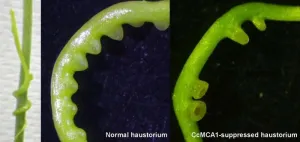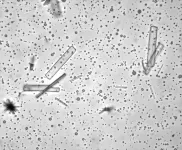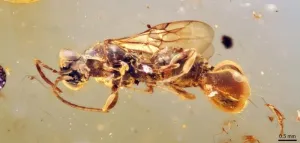(Press-News.org)
Molecular biologist Yali Dou, PhD, holder of the Marion and Harry Keiper Chair in Cancer Research and professor of medicine and cancer biology at the Keck School of Medicine of USC, has been elected a fellow of the American Association for the Advancement of Science (AAAS). She is one of seven USC faculty members in the 2025 cohort of new fellows.
The AAAS is the world’s oldest and largest general science organization and the publisher of Science, a top peer-reviewed academic journal. Election as a fellow is a lifetime honor — one of the AAAS’s highest — signaling extraordinary achievement in the advancement or application of science.
Dou, the associate director for basic research at USC Norris Comprehensive Cancer Center, is a recognized leader in the study of epigenetics, the mechanisms that enable the singular instructions in DNA to be expressed as myriad cell and tissue types. She has made major contributions to the fundamental understanding of a family of enzymes that plays a vital role in fetal development by altering the coiled chromatin, which packages DNA to fit in the chromosomes of a cell’s nucleus, so that genes are activated. Because mutations of the founding member of this family of enzymes can also spur leukemia, they are known as mixed-lineage leukemia proteins, or MLL. MLL enzymes are among the most frequently mutated genes in cancer.
The National Institutes of Health (NIH) have continuously funded Dou’s research since 2009 and her influential studies have been highly cited in peer-reviewed biomedical literature.
Looking at the accomplishments of other new AAAS fellows, she notes that she is in good company.
“A lot of great scientists are being recognized this way,” said Dou, who is also co-director of the Ph.D. Program in Molecular Medicine at the Keck School of Medicine. “It’s an honor to be part of the prestigious group. Now more than ever, it is important to recognize the contributions of science and scientists to our society.”
She is quick to share the credit for the advances that have grown out of her investigations.
“I want to acknowledge all of the people in my lab who have contributed so much to my career,” Dou said. “They’re actually the ones that carry out the work, so I share this honor with them.”
Next to nothing was known about MLL enzymes when she began exploring their structure and function early in her career. Dou has broken down the complex of MLL1, the founding member of that family, to its composite pieces and rebuilt it. She has identified the molecular basis to make it work and found a way to block its activity. From the start, curiosity was her guide.
“What really drives me is the potential to identify something new,” Dou said. “Every time we answer an old question, new questions open up. There’s still a lot for us to understand about how this enzyme works.”
While rearrangement in the MLL1 gene is associated with an aggressive form of childhood leukemia, the enzyme is also amplified or overexpressed in diseases such as breast cancer and liver cancer. Moving from discovery to application, Dou has led the development of potential cancer treatments that take MLL1 as their target.
“We did systematic work from the beginning,” she said. “It went from purifying the protein complex to identifying its regulator, to developing a probe that inhibits its enzymatic activity. With that probe, we can ask important questions that we otherwise couldn’t. Eventually, we hope that the drugs we develop targeting MLL will provide new treatment options for cancer patients.”
Her prolific collaborations with other scientists have led Dou’s investigations into numerous other fields of study such as exploring MLL’s role in the heart and brain. With advances in big data and computing power, she plans to branch out further in the years ahead.
“A great deal of groundbreaking science emerges at the intersection of disciplines, and when the opportunity arises to explore uncharted territory, I embrace a curious and exploratory mindset,” she said. “Going forward, our goal is not merely to understand a single gene or process but to expand our research scope for a more holistic perspective that ultimately advances our understanding of biology and translates it to benefit patients.”
Dou has been recognized with the Leukemia & Lymphoma Society Scholar Award, Stand Up to Cancer’s Innovative Research Grant, the American Cancer Society’s Research Scholars Grant and the American Association for Cancer Research’s Getrude B. Elion Cancer Research Award. She currently serves as chair of the NIH’s Cancer Genetics Study Section.
Before joining the Keck School of Medicine, Dou was a faculty member at the University of Michigan. She earned her PhD from the University of Rochester and completed her postdoctoral training at Rockefeller University.
END
University of Leeds news
Embargoed until 10:00 GMT, 27 March
Damaging cluster of UK winter storms driven by swirling polar vortex miles above Earth
Powerful winter storms which led to deaths and power outages in the UK and Ireland were made more likely by an intense swirling vortex of winds miles above the Arctic, say scientists.
A team of researchers led by the University of Leeds has pinpointed a new reason for winter storm clusters such as the trio named Dudley, Eunice and Franklin, which hit the nation within the space of a week in February 2022.
The findings which are published today in the journal ...
In the past, intact forests absorbed 7.8 billion tonnes of CO₂ annually – about a fifth of all human emissions – but their carbon storage is increasingly at risk from climate change and human activities such as deforestation. A new study from the Potsdam Institute for Climate Impact Research (PIK) shows that failing to account for the potentially decreasing ability of forests to absorb CO₂ could make reaching the Paris agreement targets significantly harder, if not impossible, and much more costly.
“Delaying action leads to disproportionately higher costs,” explains Michael Windisch, ...
A new medical database automatically compiles the medical records of obese patients and those suffering from obesity-related diseases in a uniquely comprehensive and reliable manner. The initiative, led by Kobe University, offers valuable insights for health promotion and drug development.
“Obesity is at the root of many diseases,” says OGAWA Wataru, an endocrinologist at Kobe University. Obesity has been linked to the development of diabetes, hypertension, gout, coronary heart disease, stroke and many other diseases. Monitoring, treating and preventing obesity and the diseases it can cause is therefore not only good for ...
The parasitic vine Cuscuta campestris grows by latching onto the stems and leaves of plants and inserting organs called haustorium into the host plant tissues to draw nutrients. The haustorium is formed when ion channels in the cell membrane are stimulated during coiling and induce a reaction within the cell.
Further, Cuscuta campestris has many types of ion channels, but which ones were linked to the development of haustorium were previously unknown.
“For the first time, the genes involved in sensing ...
A new study led by researchers at the Earth-Life Science Institute (ELSI) at Institute of Science Tokyo has uncovered a surprising role for calcium in shaping life’s earliest molecular structures. Their findings suggest that calcium ions can selectively influence how primitive polymers form, shedding light on a long-standing mystery: how life’s molecules came to prefer a single “handedness” (chirality).
Like our left and right hands, many molecules exist in two mirror-image forms. Yet life on Earth has a striking preference: ...
People living with Long Covid often feel dismissed, disbelieved and unsupported by their healthcare providers, according to a new study from the University of Surrey.
The study, which was published in the Journal of Health Psychology, looked at how patients with Long Covid experience their illness. The study found that many patients feel they have to prove their illness is physical to be taken seriously and, as a result, often reject psychological support, fearing it implies their symptoms are "all in the mind".
Professor ...
Wearable mobile health technology could help people with Type 2 Diabetes (T2D) to stick to exercise regimes that help them to keep the condition under control, a new study reveals.
Researchers studied the behaviour of recently-diagnosed T2D patients in Canada and the UK as they followed a home-based physical activity programme – some of whom wore a smartwatch paired with a health app on their smartphone.
They discovered that MOTIVATE-T2D participants were more likely to start and maintain purposeful exercise at if they had the support of wearable technology- the study successfully recruited 125 participants with an 82% ...
An extinct lineage of parasitic wasps dating from the mid-Cretaceous period and preserved in amber may have used their Venus flytrap-like abdomen to capture and immobilise their prey. Research, published in BMC Biology, finds that the specimens of Sirenobethylus charybdis — named for the sea monster in Greek mythology which swallowed and disgorged water three times a day — date from almost 99 million years ago and may represent a new family of insects.
The morphology of S. charybdis indicates the wasps were ...
A new species of fossil from 444 million years ago that has perfectly preserved insides has been affectionately named ‘Sue’ after its discoverer’s mum.
The result of 25 years of work by a University of Leicester palaeontologist and published in the journal Palaeontology, the study details a new species of multisegmented fossil and is now officially named as Keurbos susanae.
Lead author Professor Sarah Gabbott from the School of Geography, Geology and the Environment said: “‘Sue’ is an inside-out, legless, headless wonder. Remarkably her insides are a mineralised ...
New modelling analysis suggests that proposed funding cuts by major donor countries to foreign aid could undo decades of progress made to end HIV/AIDS as a public health threat and new infections and deaths could surge back to levels not seen since the early 2000s.
The study estimates there could be between 4.4 million to 10.8 million additional new HIV infections by 2030 in low-and-middle income countries (LMICs) and between 770,000 to 2.9 million HIV-related deaths in children and adults by 2030.
The greatest impact from potential funding ...





